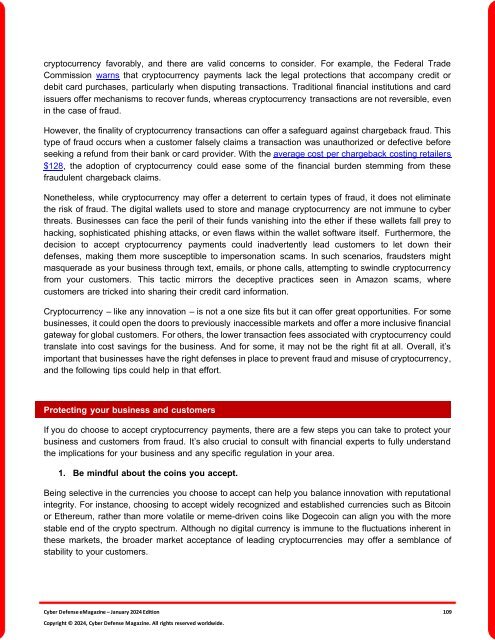The Cyber Defense eMagazine January Edition for 2024
Cyber Defense eMagazine January Edition for 2024 #CDM #CYBERDEFENSEMAG @CyberDefenseMag by @Miliefsky a world-renowned cyber security expert and the Publisher of Cyber Defense Magazine as part of the Cyber Defense Media Group as well as Yan Ross, Editor-in-Chief and many more writers, partners and supporters who make this an awesome publication! 201 page January Edition fully packed with some of our best content. Thank you all and to our readers! OSINT ROCKS! #CDM #CDMG #OSINT #CYBERSECURITY #INFOSEC #BEST #PRACTICES #TIPS #TECHNIQUES
Cyber Defense eMagazine January Edition for 2024 #CDM #CYBERDEFENSEMAG @CyberDefenseMag by @Miliefsky a world-renowned cyber security expert and the Publisher of Cyber Defense Magazine as part of the Cyber Defense Media Group as well as Yan Ross, Editor-in-Chief and many more writers, partners and supporters who make this an awesome publication! 201 page January Edition fully packed with some of our best content. Thank you all and to our readers! OSINT ROCKS! #CDM #CDMG #OSINT #CYBERSECURITY #INFOSEC #BEST #PRACTICES #TIPS #TECHNIQUES
Create successful ePaper yourself
Turn your PDF publications into a flip-book with our unique Google optimized e-Paper software.
cryptocurrency favorably, and there are valid concerns to consider. For example, the Federal Trade<br />
Commission warns that cryptocurrency payments lack the legal protections that accompany credit or<br />
debit card purchases, particularly when disputing transactions. Traditional financial institutions and card<br />
issuers offer mechanisms to recover funds, whereas cryptocurrency transactions are not reversible, even<br />
in the case of fraud.<br />
However, the finality of cryptocurrency transactions can offer a safeguard against chargeback fraud. This<br />
type of fraud occurs when a customer falsely claims a transaction was unauthorized or defective be<strong>for</strong>e<br />
seeking a refund from their bank or card provider. With the average cost per chargeback costing retailers<br />
$128, the adoption of cryptocurrency could ease some of the financial burden stemming from these<br />
fraudulent chargeback claims.<br />
Nonetheless, while cryptocurrency may offer a deterrent to certain types of fraud, it does not eliminate<br />
the risk of fraud. <strong>The</strong> digital wallets used to store and manage cryptocurrency are not immune to cyber<br />
threats. Businesses can face the peril of their funds vanishing into the ether if these wallets fall prey to<br />
hacking, sophisticated phishing attacks, or even flaws within the wallet software itself. Furthermore, the<br />
decision to accept cryptocurrency payments could inadvertently lead customers to let down their<br />
defenses, making them more susceptible to impersonation scams. In such scenarios, fraudsters might<br />
masquerade as your business through text, emails, or phone calls, attempting to swindle cryptocurrency<br />
from your customers. This tactic mirrors the deceptive practices seen in Amazon scams, where<br />
customers are tricked into sharing their credit card in<strong>for</strong>mation.<br />
Cryptocurrency – like any innovation – is not a one size fits but it can offer great opportunities. For some<br />
businesses, it could open the doors to previously inaccessible markets and offer a more inclusive financial<br />
gateway <strong>for</strong> global customers. For others, the lower transaction fees associated with cryptocurrency could<br />
translate into cost savings <strong>for</strong> the business. And <strong>for</strong> some, it may not be the right fit at all. Overall, it’s<br />
important that businesses have the right defenses in place to prevent fraud and misuse of cryptocurrency,<br />
and the following tips could help in that ef<strong>for</strong>t.<br />
Protecting your business and customers<br />
If you do choose to accept cryptocurrency payments, there are a few steps you can take to protect your<br />
business and customers from fraud. It’s also crucial to consult with financial experts to fully understand<br />
the implications <strong>for</strong> your business and any specific regulation in your area.<br />
1. Be mindful about the coins you accept.<br />
Being selective in the currencies you choose to accept can help you balance innovation with reputational<br />
integrity. For instance, choosing to accept widely recognized and established currencies such as Bitcoin<br />
or Ethereum, rather than more volatile or meme-driven coins like Dogecoin can align you with the more<br />
stable end of the crypto spectrum. Although no digital currency is immune to the fluctuations inherent in<br />
these markets, the broader market acceptance of leading cryptocurrencies may offer a semblance of<br />
stability to your customers.<br />
<strong>Cyber</strong> <strong>Defense</strong> <strong>eMagazine</strong> – <strong>January</strong> <strong>2024</strong> <strong>Edition</strong> 109<br />
Copyright © <strong>2024</strong>, <strong>Cyber</strong> <strong>Defense</strong> Magazine. All rights reserved worldwide.

















